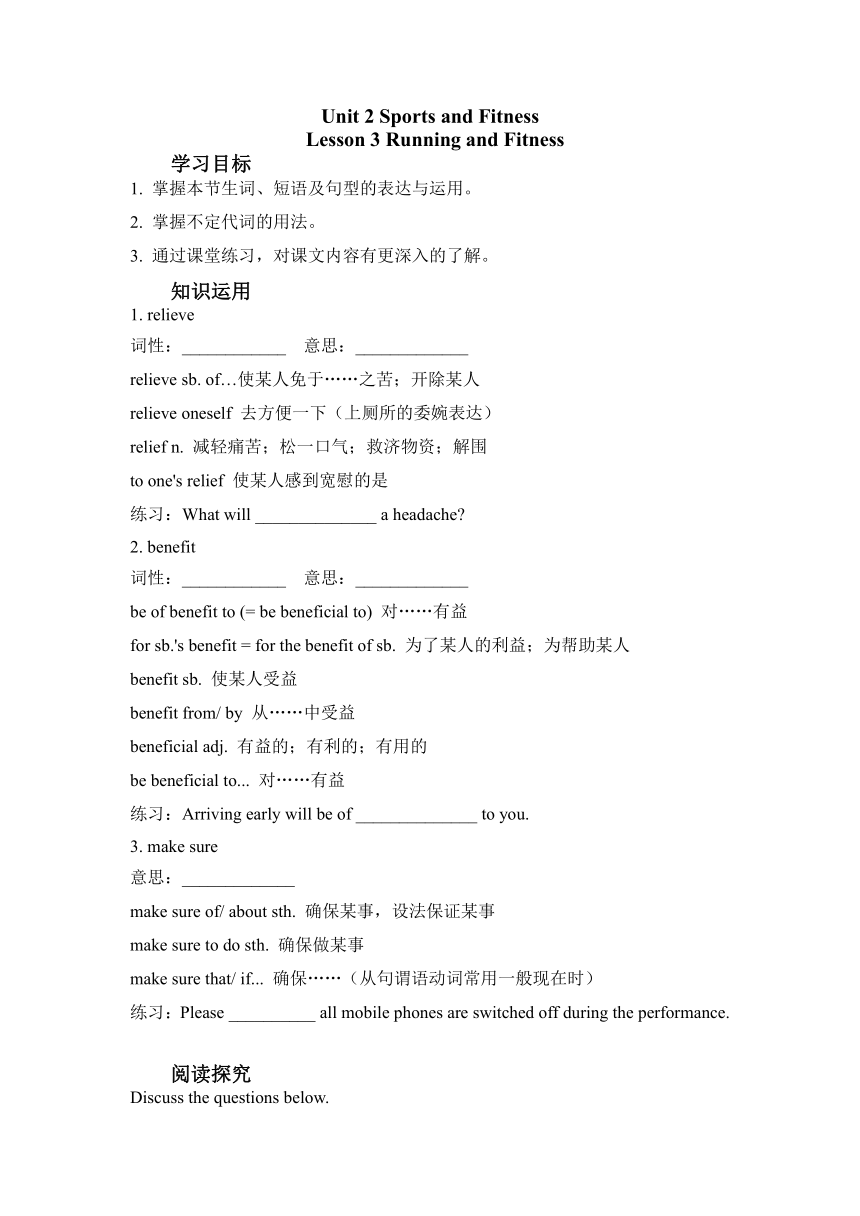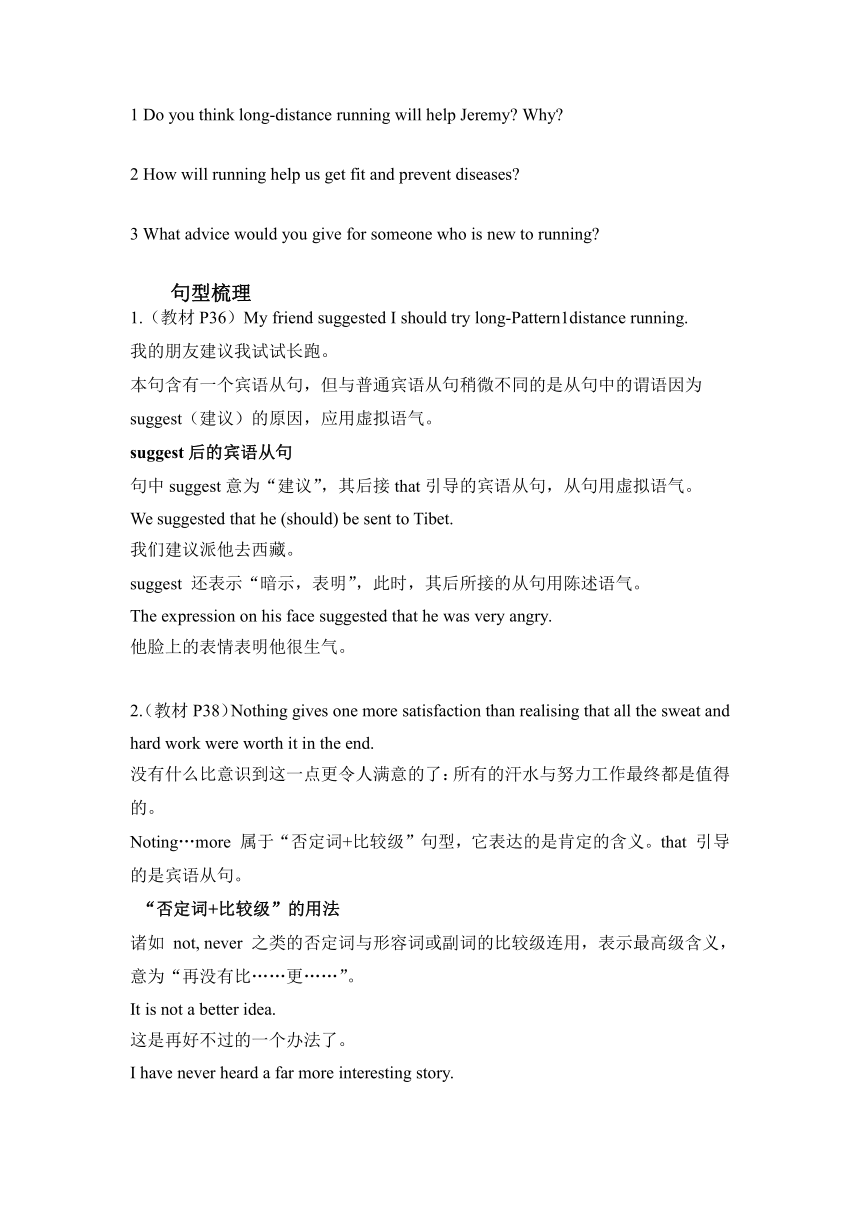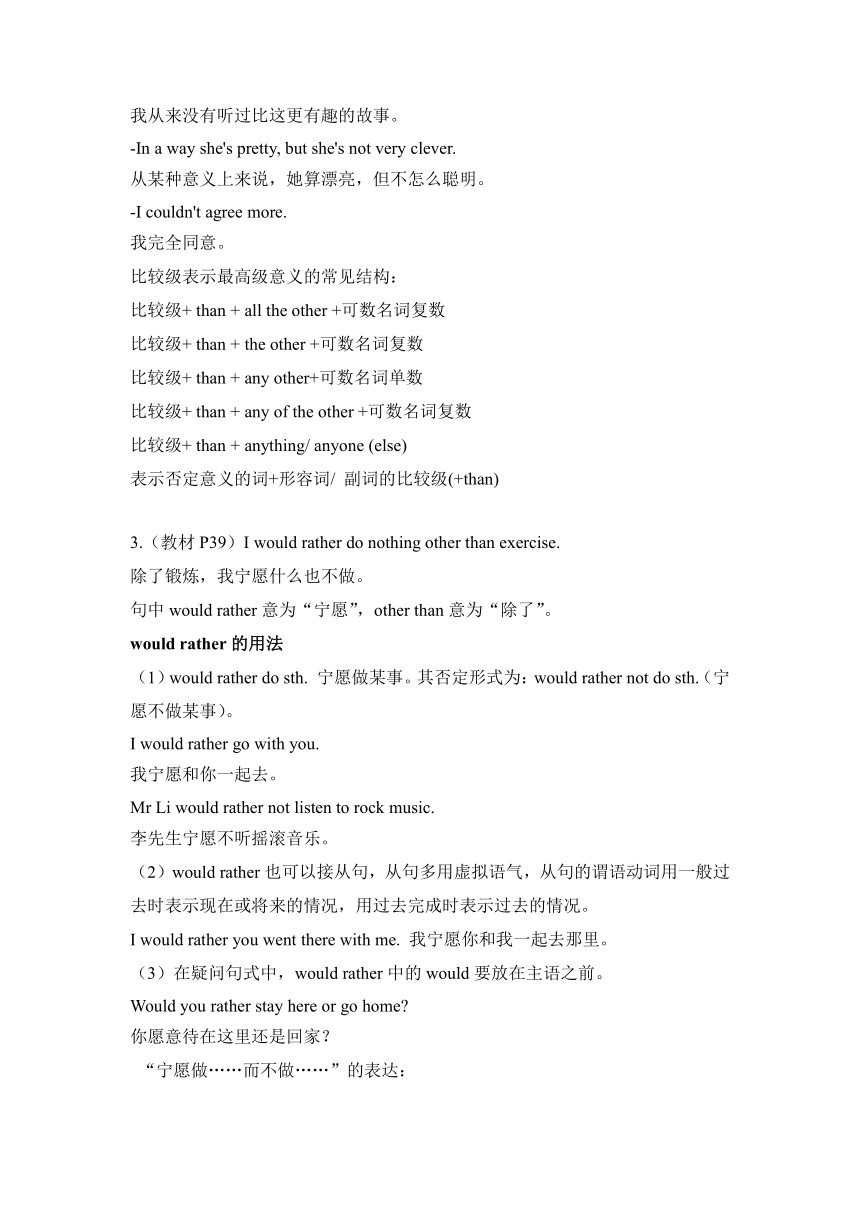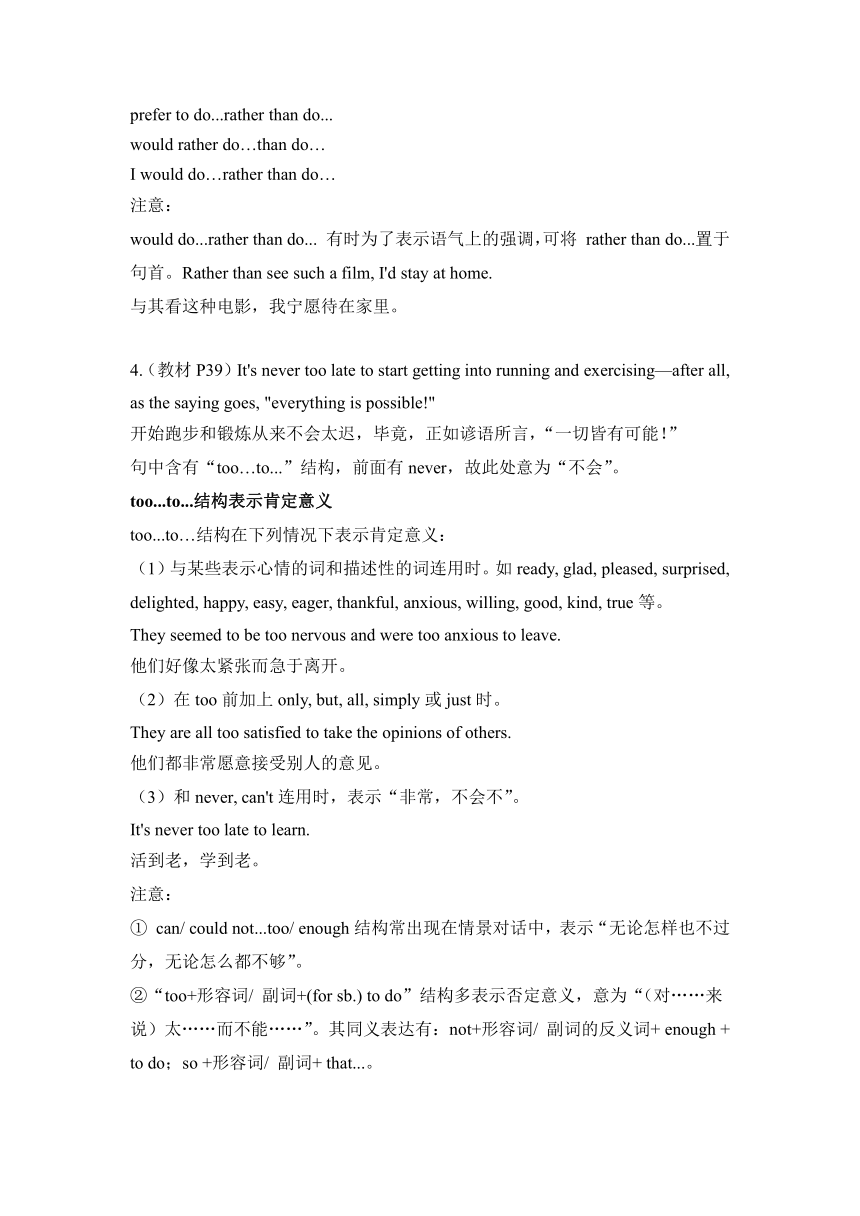北师大版(2019)必修第一册Unit 2 Sports and Fitness Lesson 3 学案(含答案)
文档属性
| 名称 | 北师大版(2019)必修第一册Unit 2 Sports and Fitness Lesson 3 学案(含答案) |

|
|
| 格式 | docx | ||
| 文件大小 | 34.6KB | ||
| 资源类型 | 教案 | ||
| 版本资源 | 北师大版(2019) | ||
| 科目 | 英语 | ||
| 更新时间 | 2022-10-18 00:00:00 | ||
图片预览





文档简介
Unit 2 Sports and Fitness
Lesson 3 Running and Fitness
学习目标
1. 掌握本节生词、短语及句型的表达与运用。
2. 掌握不定代词的用法。
3. 通过课堂练习,对课文内容有更深入的了解。
知识运用
1. relieve
词性:____________ 意思:_____________
relieve sb. of…使某人免于……之苦;开除某人
relieve oneself 去方便一下(上厕所的委婉表达)
relief n. 减轻痛苦;松一口气;救济物资;解围
to one's relief 使某人感到宽慰的是
练习:What will ______________ a headache
2. benefit
词性:____________ 意思:_____________
be of benefit to (= be beneficial to) 对……有益
for sb.'s benefit = for the benefit of sb. 为了某人的利益;为帮助某人
benefit sb. 使某人受益
benefit from/ by 从……中受益
beneficial adj. 有益的;有利的;有用的
be beneficial to... 对……有益
练习:Arriving early will be of ______________ to you.
3. make sure
意思:_____________
make sure of/ about sth. 确保某事,设法保证某事
make sure to do sth. 确保做某事
make sure that/ if... 确保……(从句谓语动词常用一般现在时)
练习:Please __________ all mobile phones are switched off during the performance.
阅读探究
Discuss the questions below.
1 Do you think long-distance running will help Jeremy Why
2 How will running help us get fit and prevent diseases
3 What advice would you give for someone who is new to running
句型梳理
1.(教材P36)My friend suggested I should try long-Pattern1distance running.
我的朋友建议我试试长跑。
本句含有一个宾语从句,但与普通宾语从句稍微不同的是从句中的谓语因为suggest(建议)的原因,应用虚拟语气。
suggest后的宾语从句
句中suggest意为“建议”,其后接that引导的宾语从句,从句用虚拟语气。
We suggested that he (should) be sent to Tibet.
我们建议派他去西藏。
suggest 还表示“暗示,表明”,此时,其后所接的从句用陈述语气。
The expression on his face suggested that he was very angry.
他脸上的表情表明他很生气。
2.(教材P38)Nothing gives one more satisfaction than realising that all the sweat and hard work were worth it in the end.
没有什么比意识到这一点更令人满意的了:所有的汗水与努力工作最终都是值得的。
Noting…more 属于“否定词+比较级”句型,它表达的是肯定的含义。that 引导的是宾语从句。
“否定词+比较级”的用法
诸如 not, never 之类的否定词与形容词或副词的比较级连用,表示最高级含义,意为“再没有比……更……”。
It is not a better idea.
这是再好不过的一个办法了。
I have never heard a far more interesting story.
我从来没有听过比这更有趣的故事。
-In a way she's pretty, but she's not very clever.
从某种意义上来说,她算漂亮,但不怎么聪明。
-I couldn't agree more.
我完全同意。
比较级表示最高级意义的常见结构:
比较级+ than + all the other +可数名词复数
比较级+ than + the other +可数名词复数
比较级+ than + any other+可数名词单数
比较级+ than + any of the other +可数名词复数
比较级+ than + anything/ anyone (else)
表示否定意义的词+形容词/ 副词的比较级(+than)
3.(教材P39)I would rather do nothing other than exercise.
除了锻炼,我宁愿什么也不做。
句中would rather意为“宁愿”,other than意为“除了”。
would rather的用法
(1)would rather do sth. 宁愿做某事。其否定形式为:would rather not do sth.(宁愿不做某事)。
I would rather go with you.
我宁愿和你一起去。
Mr Li would rather not listen to rock music.
李先生宁愿不听摇滚音乐。
(2)would rather也可以接从句,从句多用虚拟语气,从句的谓语动词用一般过去时表示现在或将来的情况,用过去完成时表示过去的情况。
I would rather you went there with me. 我宁愿你和我一起去那里。
(3)在疑问句式中,would rather中的would要放在主语之前。
Would you rather stay here or go home
你愿意待在这里还是回家?
“宁愿做……而不做……”的表达:
prefer to do...rather than do...
would rather do…than do…
I would do…rather than do…
注意:
would do...rather than do... 有时为了表示语气上的强调,可将 rather than do...置于句首。Rather than see such a film, I'd stay at home.
与其看这种电影,我宁愿待在家里。
4.(教材P39)It's never too late to start getting into running and exercising—after all, as the saying goes, "everything is possible!"
开始跑步和锻炼从来不会太迟,毕竟,正如谚语所言,“一切皆有可能!”
句中含有“too…to...”结构,前面有never,故此处意为“不会”。
too...to...结构表示肯定意义
too...to…结构在下列情况下表示肯定意义:
(1)与某些表示心情的词和描述性的词连用时。如ready, glad, pleased, surprised, delighted, happy, easy, eager, thankful, anxious, willing, good, kind, true等。
They seemed to be too nervous and were too anxious to leave.
他们好像太紧张而急于离开。
(2)在too前加上only, but, all, simply或just时。
They are all too satisfied to take the opinions of others.
他们都非常愿意接受别人的意见。
(3)和never, can't连用时,表示“非常,不会不”。
It's never too late to learn.
活到老,学到老。
注意:
① can/ could not...too/ enough结构常出现在情景对话中,表示“无论怎样也不过分,无论怎么都不够”。
②“too+形容词/ 副词+(for sb.) to do”结构多表示否定意义,意为“(对……来说)太……而不能……”。其同义表达有:not+形容词/ 副词的反义词+ enough + to do;so +形容词/ 副词+ that...。
语法解析
语法:不定代词
不定代词主要有:all, each, every, both, either, neither, one, none, little, few, many, much, other, another, some, any, no等。还有由some, any, no, every和one, body, thing等构成的合成代词。不定代词具有名词和形容词的性质,并有可数和不可数之分,在句中可以作主语、表语、宾语、同位语、定语、状语等(every,no只能作定语)。
1. some与any
(1)一般用法:
some, any可与单、复数可数名词及不可数名词连用。some一般用于肯定句,any多用于疑问句、否定句或条件句。
(2)特殊用法:
① any用于肯定句表示“任何”。
Any child can do that. (定语)
You may take any of them. (宾语)
② some 修饰名词,表示“一些”,用于肯定句中。
Some positions require students to be 15 to 24 or up to 29 for persons with a disability.
③ 在期待对方回答yes时,some用在表示请求或邀请的问句中。
Mum, could you give me some money (请求)
Would you like some bananas (邀请)
④ some用于否定句表示部分否定。
I don't know some of the students.(宾语)
⑤ some 和any 还有副词的词性,在句中可作状语。some意为“大约”,相当于about;而any则表示程度,意为“稍微,丝毫”。
There are some 300 workers on strike. Do you feel any better today
2. one, both 与all
(1)one作定语、表语、主语或宾语,可以指人或物,表示“一个”,其复数为ones;指人时,其所有格是one's,反身代词是oneself。
One should try one's best to serve the people. This is not the one I want.
(2)one, ones可以代替上文提到过的名词,以免重复。one, ones分别可以用this, that; these, those或the, which等词修饰。
Here are three pens. Which one is yours, this one or that one or the one in the pencil case
These books are more interesting than those ones.
(3)both用作定语、宾语、主语和同位语,可以指人或指物,表示“两者都”。
both 用于否定句时,表示部分否定;表示完全否定时,用 neither。
Both of us are not teachers. (部分否定)
Neither of us is a teacher.(完全否定)
both不能放在the, these, those, my等词之后,而应放在它们的前面。
Both my parents like this film. Both the boys are tall.
(4)all用作主语、表语、宾语、定语或同位语,指“全部的;整个的”,可与可数名词或不可数名词连用;除少数情况外,一般不与单数可数名词连用;与复数可数名词连用时,表示“所有的,全部的”,指三个或三个以上的人或物。
注意:
all用于否定句时,表示部分否定;表示完全否定用none。
Not all the ants go out for food.(部分否定)
None of the money is mine.(完全否定)
3. it/ one/ that/ those
(1)it特指上文提到的那个事物,替代单数可数名词或不可数名词
He bought a book and lent it to me.
他买了一本书,并把它借给了我。
(2)one泛指与上文提到的同类的事物中的一个,替代单数可数名词;若是替代复数可数名词则用ones
Its color is blue; I want a red one.
它的颜色是蓝色的,我想要一个红色的。
(3)that特指与上文提到的同类事物的另一事物,用于替代不可数名词或单数可数名词
The weather here is colder than that in China.
这儿的天气比中国的天气冷。
(4)those特指与上文提到的同类人/ 事物的另一些人/ 事物,用于替代复数可数名词
These books are better than those on the shelf.
这些书比书架上的那些书更好。
4. many和much
many 和much都表示“许多”,但many修饰或代替复数可数名词,much修饰或代替不可数名词。它们在句中可作主语、宾语和定语。much有时用作状语。
5. few, little, a few 和 a little
few和little表示“没有多少”,含否定意义;而a few和a little表示“有一些,有几个”,含肯定意义。另外,few和a few 修饰可数名词;little和a little修饰不可数名词。它们在句中常用作定语、主语和宾语。
6. no和none
no = not any,表示“没有”,用来修饰可数名词或不可数名词,通常作定语。none代替不可数名词作主语时,谓语动词用单数形式;代替可数名词作主语时,谓语动词可用单数形式也可用复数形式。none还可以在句中作宾语。none既可以指人又可以指物,no one只能指人。
7. each和every
each(各个)指两个或两个以上的人或物,侧重个体,在句中作主语、宾语、定语或同位语;every(每个)指三个或三个以上的人或物,侧重整体,在句中只能作定语。
Each of them has been there. (主语)
The teacher gave each of the students a new textbook.(宾语)
We each got a ticket.(同位语)
Each student in our class has a dictionary.(定语,强调每个个体)
Every student in our class has a dictionary.(定语,强调班上“所有的人”)
8. either和neither
either是“两者中任何一个”的意思,可修饰或代替单数可数名词;neither是“两者中没有一个”的意思,可以修饰或代替单数可数名词,它们可在句中作主语、宾语或定语。
Here are two pens. You may take either of them.(宾语)
Neither boy knows French.(定语)
注意:
① either用作副词,意为“也”,用于否定句的句末。
He doesn't like tea, and I don't either.
② either 与or 连用,意为“不是……就是……”或“要么……要么……”。
He is either Japanese or Chinese.
③ neither用作副词,意为“也不”,即“not…either”。
He can't do it. Neither can I.
④ neither可与nor连用,意为“既不……也不……”。
Neither he nor you are a student.
9. the other和another, the others 和others
(1)the other表示“两者中的另一个”;“the other+复数可数名词”及the others表示“其他的全部人或物”。others 及“other +复数可数名词”泛指“其他的/ 别的人或物”。这些词语在句中可作主语、宾语或定语。
He got two books; one is a textbook, and the other is a novel.
Five of the pencils are red; the others/ the other pens are yellow.
Some are singing; others are dancing.
(2)another 修饰或代替单数可数名词,意为“(三者或三者以上的)另一个”,不能指两者中的另一个,在句中可作宾语和定语。
This coat is too dark. Please show me another.(宾语)
Please give me another book.(定语)
注意:another修饰复数可数名词时,意为“再,又”。
Please give me another ten minutes. = Please give me ten more minutes.
练习:
1. Jack and Tom are good friends and ____________ are in the same class.
2. When living overseas in a place where people speak a different language, ____________ can be difficult to make yourself understood.
3. The cost of renting a house in central Xi'an is higher than ____________ in any other area of the city.
4. To stay awake, he finished a cup of coffee and ordered ____________.
5. Larry asks Bill and Peter to go on a picnic with him, but ____________ of them wants to, because they have work to do.
6. I got this bicycle for ____________. My friend gave it to me when she bought a new one.
7. Dad lost his job, and as Mom explained, "He was lucky to find ____________ one."
8. Mother's Day is coming. I'm sorry that I am abroad and can't send ____________ (your) flowers.
答案
知识运用
1. relieve 2. benefit 3. make sure
阅读探究
1 Yes. I think long-distance running will help Jeremy because long-distance running will help him get fit and prevent diseases. And it will give him good upper and lower body strength. It may help him pass the PE exams.
2 Running increases the flow of blood and oxygen to the brain. It makes our heart stronger and allows more blood to flow around the body. It also strengthens the immune system and reduces the risk of serious health problems.
3 I would advise someone new to running to start slowly and remember it takes time to become a great runner.
语法解析
1. both 2. it 3. that 4. another 5. neither 6. nothing 7. another 8. you
Lesson 3 Running and Fitness
学习目标
1. 掌握本节生词、短语及句型的表达与运用。
2. 掌握不定代词的用法。
3. 通过课堂练习,对课文内容有更深入的了解。
知识运用
1. relieve
词性:____________ 意思:_____________
relieve sb. of…使某人免于……之苦;开除某人
relieve oneself 去方便一下(上厕所的委婉表达)
relief n. 减轻痛苦;松一口气;救济物资;解围
to one's relief 使某人感到宽慰的是
练习:What will ______________ a headache
2. benefit
词性:____________ 意思:_____________
be of benefit to (= be beneficial to) 对……有益
for sb.'s benefit = for the benefit of sb. 为了某人的利益;为帮助某人
benefit sb. 使某人受益
benefit from/ by 从……中受益
beneficial adj. 有益的;有利的;有用的
be beneficial to... 对……有益
练习:Arriving early will be of ______________ to you.
3. make sure
意思:_____________
make sure of/ about sth. 确保某事,设法保证某事
make sure to do sth. 确保做某事
make sure that/ if... 确保……(从句谓语动词常用一般现在时)
练习:Please __________ all mobile phones are switched off during the performance.
阅读探究
Discuss the questions below.
1 Do you think long-distance running will help Jeremy Why
2 How will running help us get fit and prevent diseases
3 What advice would you give for someone who is new to running
句型梳理
1.(教材P36)My friend suggested I should try long-Pattern1distance running.
我的朋友建议我试试长跑。
本句含有一个宾语从句,但与普通宾语从句稍微不同的是从句中的谓语因为suggest(建议)的原因,应用虚拟语气。
suggest后的宾语从句
句中suggest意为“建议”,其后接that引导的宾语从句,从句用虚拟语气。
We suggested that he (should) be sent to Tibet.
我们建议派他去西藏。
suggest 还表示“暗示,表明”,此时,其后所接的从句用陈述语气。
The expression on his face suggested that he was very angry.
他脸上的表情表明他很生气。
2.(教材P38)Nothing gives one more satisfaction than realising that all the sweat and hard work were worth it in the end.
没有什么比意识到这一点更令人满意的了:所有的汗水与努力工作最终都是值得的。
Noting…more 属于“否定词+比较级”句型,它表达的是肯定的含义。that 引导的是宾语从句。
“否定词+比较级”的用法
诸如 not, never 之类的否定词与形容词或副词的比较级连用,表示最高级含义,意为“再没有比……更……”。
It is not a better idea.
这是再好不过的一个办法了。
I have never heard a far more interesting story.
我从来没有听过比这更有趣的故事。
-In a way she's pretty, but she's not very clever.
从某种意义上来说,她算漂亮,但不怎么聪明。
-I couldn't agree more.
我完全同意。
比较级表示最高级意义的常见结构:
比较级+ than + all the other +可数名词复数
比较级+ than + the other +可数名词复数
比较级+ than + any other+可数名词单数
比较级+ than + any of the other +可数名词复数
比较级+ than + anything/ anyone (else)
表示否定意义的词+形容词/ 副词的比较级(+than)
3.(教材P39)I would rather do nothing other than exercise.
除了锻炼,我宁愿什么也不做。
句中would rather意为“宁愿”,other than意为“除了”。
would rather的用法
(1)would rather do sth. 宁愿做某事。其否定形式为:would rather not do sth.(宁愿不做某事)。
I would rather go with you.
我宁愿和你一起去。
Mr Li would rather not listen to rock music.
李先生宁愿不听摇滚音乐。
(2)would rather也可以接从句,从句多用虚拟语气,从句的谓语动词用一般过去时表示现在或将来的情况,用过去完成时表示过去的情况。
I would rather you went there with me. 我宁愿你和我一起去那里。
(3)在疑问句式中,would rather中的would要放在主语之前。
Would you rather stay here or go home
你愿意待在这里还是回家?
“宁愿做……而不做……”的表达:
prefer to do...rather than do...
would rather do…than do…
I would do…rather than do…
注意:
would do...rather than do... 有时为了表示语气上的强调,可将 rather than do...置于句首。Rather than see such a film, I'd stay at home.
与其看这种电影,我宁愿待在家里。
4.(教材P39)It's never too late to start getting into running and exercising—after all, as the saying goes, "everything is possible!"
开始跑步和锻炼从来不会太迟,毕竟,正如谚语所言,“一切皆有可能!”
句中含有“too…to...”结构,前面有never,故此处意为“不会”。
too...to...结构表示肯定意义
too...to…结构在下列情况下表示肯定意义:
(1)与某些表示心情的词和描述性的词连用时。如ready, glad, pleased, surprised, delighted, happy, easy, eager, thankful, anxious, willing, good, kind, true等。
They seemed to be too nervous and were too anxious to leave.
他们好像太紧张而急于离开。
(2)在too前加上only, but, all, simply或just时。
They are all too satisfied to take the opinions of others.
他们都非常愿意接受别人的意见。
(3)和never, can't连用时,表示“非常,不会不”。
It's never too late to learn.
活到老,学到老。
注意:
① can/ could not...too/ enough结构常出现在情景对话中,表示“无论怎样也不过分,无论怎么都不够”。
②“too+形容词/ 副词+(for sb.) to do”结构多表示否定意义,意为“(对……来说)太……而不能……”。其同义表达有:not+形容词/ 副词的反义词+ enough + to do;so +形容词/ 副词+ that...。
语法解析
语法:不定代词
不定代词主要有:all, each, every, both, either, neither, one, none, little, few, many, much, other, another, some, any, no等。还有由some, any, no, every和one, body, thing等构成的合成代词。不定代词具有名词和形容词的性质,并有可数和不可数之分,在句中可以作主语、表语、宾语、同位语、定语、状语等(every,no只能作定语)。
1. some与any
(1)一般用法:
some, any可与单、复数可数名词及不可数名词连用。some一般用于肯定句,any多用于疑问句、否定句或条件句。
(2)特殊用法:
① any用于肯定句表示“任何”。
Any child can do that. (定语)
You may take any of them. (宾语)
② some 修饰名词,表示“一些”,用于肯定句中。
Some positions require students to be 15 to 24 or up to 29 for persons with a disability.
③ 在期待对方回答yes时,some用在表示请求或邀请的问句中。
Mum, could you give me some money (请求)
Would you like some bananas (邀请)
④ some用于否定句表示部分否定。
I don't know some of the students.(宾语)
⑤ some 和any 还有副词的词性,在句中可作状语。some意为“大约”,相当于about;而any则表示程度,意为“稍微,丝毫”。
There are some 300 workers on strike. Do you feel any better today
2. one, both 与all
(1)one作定语、表语、主语或宾语,可以指人或物,表示“一个”,其复数为ones;指人时,其所有格是one's,反身代词是oneself。
One should try one's best to serve the people. This is not the one I want.
(2)one, ones可以代替上文提到过的名词,以免重复。one, ones分别可以用this, that; these, those或the, which等词修饰。
Here are three pens. Which one is yours, this one or that one or the one in the pencil case
These books are more interesting than those ones.
(3)both用作定语、宾语、主语和同位语,可以指人或指物,表示“两者都”。
both 用于否定句时,表示部分否定;表示完全否定时,用 neither。
Both of us are not teachers. (部分否定)
Neither of us is a teacher.(完全否定)
both不能放在the, these, those, my等词之后,而应放在它们的前面。
Both my parents like this film. Both the boys are tall.
(4)all用作主语、表语、宾语、定语或同位语,指“全部的;整个的”,可与可数名词或不可数名词连用;除少数情况外,一般不与单数可数名词连用;与复数可数名词连用时,表示“所有的,全部的”,指三个或三个以上的人或物。
注意:
all用于否定句时,表示部分否定;表示完全否定用none。
Not all the ants go out for food.(部分否定)
None of the money is mine.(完全否定)
3. it/ one/ that/ those
(1)it特指上文提到的那个事物,替代单数可数名词或不可数名词
He bought a book and lent it to me.
他买了一本书,并把它借给了我。
(2)one泛指与上文提到的同类的事物中的一个,替代单数可数名词;若是替代复数可数名词则用ones
Its color is blue; I want a red one.
它的颜色是蓝色的,我想要一个红色的。
(3)that特指与上文提到的同类事物的另一事物,用于替代不可数名词或单数可数名词
The weather here is colder than that in China.
这儿的天气比中国的天气冷。
(4)those特指与上文提到的同类人/ 事物的另一些人/ 事物,用于替代复数可数名词
These books are better than those on the shelf.
这些书比书架上的那些书更好。
4. many和much
many 和much都表示“许多”,但many修饰或代替复数可数名词,much修饰或代替不可数名词。它们在句中可作主语、宾语和定语。much有时用作状语。
5. few, little, a few 和 a little
few和little表示“没有多少”,含否定意义;而a few和a little表示“有一些,有几个”,含肯定意义。另外,few和a few 修饰可数名词;little和a little修饰不可数名词。它们在句中常用作定语、主语和宾语。
6. no和none
no = not any,表示“没有”,用来修饰可数名词或不可数名词,通常作定语。none代替不可数名词作主语时,谓语动词用单数形式;代替可数名词作主语时,谓语动词可用单数形式也可用复数形式。none还可以在句中作宾语。none既可以指人又可以指物,no one只能指人。
7. each和every
each(各个)指两个或两个以上的人或物,侧重个体,在句中作主语、宾语、定语或同位语;every(每个)指三个或三个以上的人或物,侧重整体,在句中只能作定语。
Each of them has been there. (主语)
The teacher gave each of the students a new textbook.(宾语)
We each got a ticket.(同位语)
Each student in our class has a dictionary.(定语,强调每个个体)
Every student in our class has a dictionary.(定语,强调班上“所有的人”)
8. either和neither
either是“两者中任何一个”的意思,可修饰或代替单数可数名词;neither是“两者中没有一个”的意思,可以修饰或代替单数可数名词,它们可在句中作主语、宾语或定语。
Here are two pens. You may take either of them.(宾语)
Neither boy knows French.(定语)
注意:
① either用作副词,意为“也”,用于否定句的句末。
He doesn't like tea, and I don't either.
② either 与or 连用,意为“不是……就是……”或“要么……要么……”。
He is either Japanese or Chinese.
③ neither用作副词,意为“也不”,即“not…either”。
He can't do it. Neither can I.
④ neither可与nor连用,意为“既不……也不……”。
Neither he nor you are a student.
9. the other和another, the others 和others
(1)the other表示“两者中的另一个”;“the other+复数可数名词”及the others表示“其他的全部人或物”。others 及“other +复数可数名词”泛指“其他的/ 别的人或物”。这些词语在句中可作主语、宾语或定语。
He got two books; one is a textbook, and the other is a novel.
Five of the pencils are red; the others/ the other pens are yellow.
Some are singing; others are dancing.
(2)another 修饰或代替单数可数名词,意为“(三者或三者以上的)另一个”,不能指两者中的另一个,在句中可作宾语和定语。
This coat is too dark. Please show me another.(宾语)
Please give me another book.(定语)
注意:another修饰复数可数名词时,意为“再,又”。
Please give me another ten minutes. = Please give me ten more minutes.
练习:
1. Jack and Tom are good friends and ____________ are in the same class.
2. When living overseas in a place where people speak a different language, ____________ can be difficult to make yourself understood.
3. The cost of renting a house in central Xi'an is higher than ____________ in any other area of the city.
4. To stay awake, he finished a cup of coffee and ordered ____________.
5. Larry asks Bill and Peter to go on a picnic with him, but ____________ of them wants to, because they have work to do.
6. I got this bicycle for ____________. My friend gave it to me when she bought a new one.
7. Dad lost his job, and as Mom explained, "He was lucky to find ____________ one."
8. Mother's Day is coming. I'm sorry that I am abroad and can't send ____________ (your) flowers.
答案
知识运用
1. relieve 2. benefit 3. make sure
阅读探究
1 Yes. I think long-distance running will help Jeremy because long-distance running will help him get fit and prevent diseases. And it will give him good upper and lower body strength. It may help him pass the PE exams.
2 Running increases the flow of blood and oxygen to the brain. It makes our heart stronger and allows more blood to flow around the body. It also strengthens the immune system and reduces the risk of serious health problems.
3 I would advise someone new to running to start slowly and remember it takes time to become a great runner.
语法解析
1. both 2. it 3. that 4. another 5. neither 6. nothing 7. another 8. you
同课章节目录
- Unit 1 Life Choices
- Lesson 1 Lifestyles
- Lesson 2 Understanding and Coping with Stress
- Lesson 3 Your Life Is What You Make It
- Unit 2 Sports and Fitness
- Lesson 1 The Underdog
- Lesson 2 Rules of the Game
- Lesson 3 Running and Fitness
- Unit 3 Celebrations
- Lesson 1 Spring Festival
- Lesson 2 Special Occasions
- Lesson 3 Memories of Christmas
